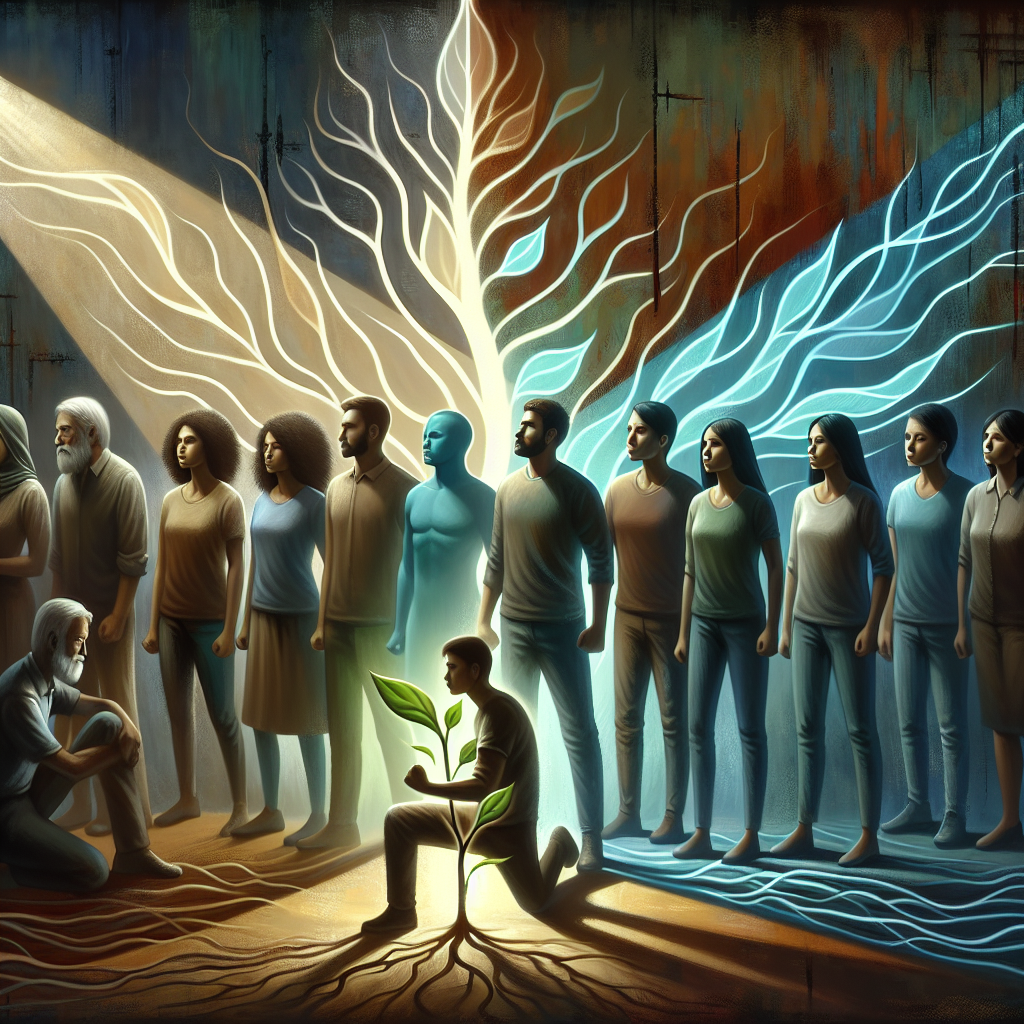Dear Cycle Breaker - Unraveling the Complexities of Intergenerational Trauma & Healing
Written by Cindy Bekkedam RD, RP (Qualifying)
Dear Cycle Breakers,
It's important to recognize that being a cycle breaker may not have been a path you consciously chose. Your own journey of hardships, traumas, and family dynamics may have led you to take on this pivotal role.
This blog article is intended to shed light on how intergenerational trauma manifests, but it's crucial to acknowledge that it provides a simplified view of the diverse narratives that exist.
I hope that this article will offer a more comprehensive understanding of the complexities you face and raise awareness of how this work may impact you. By navigating this journey, you are potentially paving the way for healthier future generations and contributing to a more resilient humanity.
I have so much love and respect for you and I thank you for helping the world heal.
Exploring the Intergenerational Transmission of Trauma Across Three Generations
1st Generation (Grandparents)
Types of Traumas/Hardships Endured
War, immigration, and oppression, resulting in physically demanding work and limited work and educational opportunities.
Struggling to meet basic survival needs such as food and housing, compounded by language barriers and social constraints.
How It May Shape Attitudes & Behaviours
Strong tendency to save and be careful with money due to experiencing scarcity.
Might hoard resources as a way of feeling secure.
Strongly believe in hard work and want a better life for the next generation.
Prefer practicality and hard work over leisure, often avoiding waste and encouraging resource conservation.
2nd Generation (Parents/Primary Caregivers)
Types of Traumas/Hardships Endured
Coping with the aftermath of immigration, including discrimination, financial stress, and acculturation challenges.
Confronting aggression, sexism, unemployment, and potential loss, along with untreated mental illness and the impact of Adverse Childhood Experiences (ACEs).
Dealing with trauma-related issues such as domestic violence, addiction, and the burden of repressed emotions.
How It May Shape Attitudes & Behaviours
They show resilience and determination, shaped by overcoming hardships.
They prioritize stability and security, aiming for financial stability for future generations.
They encourage hard work as a way to overcome challenges and prioritize practical and secure career paths for their children.
They often express their love and support through outward displays and expressions of positivity and resilience - often superficial or limited to performative actions:
one-off events
symbolic gestures/actions
verbal affirmations
Expression of love and nurturance does not always translate to substantive support for individual well-being and the skills required for emotional maturity.
They often have expectations for their children to prioritize practical and secure career paths and financial stability, framing their values around security and stability.
3rd Generation (Children/You)
Privileges AND Traumas + Hardships
Possess relative stability in terms of basic needs, including housing and food, coupled with increased opportunities for education and personal development. This often fuels feelings of guilt and shame if they are not ‘successful’ according to their parents’ defined standards.
Bearing the emotional burden of ancestral trauma, leading to increased anxiety, depression, and emotional numbing.
Struggling with identity issues, attachment trauma, perfectionism, and social media-related challenges.
Feeling burdened by emotional scars and unprocessed trauma, leading to low self-esteem, codependency, and approval-seeking tendencies.
Encountering difficulties in understanding and processing their experiences, leading to feelings of guilt and shame.
How It May Shape Attitudes & Behaviours
May internalize values such as performative resilience (positivity and toughness) and hard work from previous generations.
They often feel a strong responsibility to succeed and improve the lives of future generations, which may lead to feeling pressured to excel.
They struggle with the fear of returning to the hardship experienced by their ancestors, causing inner conflict when balancing their well-being with their caregivers’ and grandparents’ expectations/disappointments.
Reconciling Performative Resilience and Modern Mental Health
The performative resilience embodied by their caregivers encourages suppressing vulnerability and inhibiting healthy coping.
This is at odds with the modern emphasis on mental health that encourages open conversations, self-compassion, and self-care.
The clash between expectations potentially affects how the younger generation navigates emotional well-being.
This tension may lead to an awareness of the need to reconcile these different paradigms, which is required to heal the burden of cumulative intergenerational trauma and promote holistic emotional well-being across generations.
Common effects experienced with addressing intergenerational trauma and promoting healing:
1. Increased Fatigue and Mental Strain: The burden of addressing an accumulation of repressed emotions through the generations can lead to increased fatigue and mental strain. The emotional labour involved in confronting long-standing trauma and its effects can be draining.
2. Spiritual Awakenings/Existential Reflections: Reconciling intergenerational trauma and promoting emotional well-being may prompt spiritual awakenings or existential reflections. The need to heal and break the cycle of trauma can lead individuals to seek deeper understanding and meaning in their lives.
3. Desire for Healing and Coping: This generation may exhibit a strong desire for healing and coping strategies due to their awareness of the impact of intergenerational trauma. The clash between performative resilience and modern mental health emphasis may fuel a need for self-compassion, emotional expression, and holistic healing approaches.
4. Struggle with Depression and Mental Illness: The emotional and psychological weight of intergenerational trauma, along with the challenges of reconciling conflicting paradigms, may contribute to a heightened risk of depression and mental illness in this generation. The internal conflict and pressure to excel may exacerbate these struggles.
5. Emotional and Healing Resources: Addressing intergenerational trauma requires significant emotional and healing resources. Healing may necessitate an investment of time, energy, and resources for self-care, therapy, and emotional well-being. Learning true resilience involves focusing on genuine coping capacities, problem-solving skills, and emotional adaptability in the face of adversity, which are skills that were rarely passed down by previous generations.
The cycle-breakers of this time are navigating the clash between traditional resilience and modern mental health practices and are encountering a profound emotional and psychological burden. This burden may manifest through increased fatigue, a need for healing and coping strategies, potential spiritual awakenings, and a heightened vulnerability to depression and mental illness.
Future Benefits of Breaking the Cycles of Inherited Trauma
1. Intergenerational Healing:
Initiates a transformative process of intergenerational healing.
By acknowledging, understanding, and actively addressing inherited wounds, they are working to break free from the cycle of trauma, offering the prospect of healthier future generations.
2. Transformation of Resilience:
Redefining resilience and engaging in supportive coping mechanisms, can give rise to new and adaptive approaches to overcome adversity.
3. Mental Health Awareness:
Modern challenges foster increased awareness of mental health issues within communities.
By seeking healing and coping strategies, the cycle-breakers are raising awareness of mental health and promoting destigmatization.
4. Promotion of Holistic Well-being:
Efforts to navigate intergenerational trauma and seek healing and coping strategies could contribute to a greater emphasis on holistic well-being across generations.
Teach future generations to prioritize mental health, emotional healing, and resilience as integral components of overall well-being.
5. Strengthened Family Systems:
Leads to the strengthening of family systems and relationships.
Promoting open communication and seeking healing can cultivate healthy family dynamics and supportive relationships, reducing the transmission of trauma.
By actively confronting the burden of intergenerational trauma and advocating for healing and resilience, the current generation of cycle-breakers has the potential to bring about enduring positive change, leading to healthier and more resilient future generations.
To you, the courageous cycle-breakers, navigating intergenerational trauma. I see you.
Your resilience in addressing this profound burden is commendable, even when it goes unseen and acknowledged. The emotional and mental strain, spiritual reflections, and the desire for healing you experience are a gift to yourself and everyone around you.
Your efforts are paving the way for future generations to embrace holistic well-being and resilience, marking a transformative journey toward intergenerational healing.
With unwavering support and empathy,
Cindy
I provide online therapy for adults in Ontario, Canada who self-identify as cycle breakers of intergenerational trauma. Contact me if you're interested in working together.


